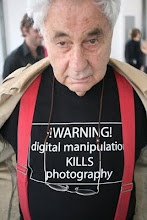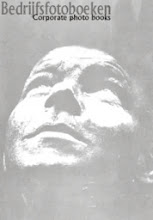


Lisboa: cidade triste e alegre – Lisbon: Sad and Happy City is a lovingly produced volume of poetry and richly printed images depicting the Portugese capital in the late 1950s.
Interspersing the carefully laid out photographs in the book is the work of Lisbon’s poets, including poems by the melancholy recluse and creator of alter egos Fernando Pessoa (1888-1935). Certainly it must be the sadness of the poetry that is refered to in the title as there are no images here that evoke much sorrow, in fact some photographs of smiling shopkeepers are more picturesque than is helpful. Was life always so convivial during the Salazar regime?
On publication Lisboa: cidade triste e alegre met with critical indiference and no further editions followed the initial print run of 2,000 copies. However, like many books featured in The Photobook: A History (Volume 1, Phaidon, 2004) by Martin Parr and Gerry Badger the few remaining copies have seen their value rise dramatically, and the volume featured here was sold at auction for double the reserve price of £4,500 ($8,865) at Christie’s in London in May 2007.
The book has a 20 page index of photographic information detailing the architects use of Plus-X and Tri-X, Leica M3 and Leitz Elmar 50 and 90mm lenses, but despite their attention to detail Lisboa never quite enriches one’s understanding of the city to the degree that Brasaï‘s Séville en Fête (1956) enriches ones understanding that other great Iberian city.
Partly it is the breadth of coverege that gives the Hungarian exile the advantage. Palla and Martins produced a wonderful volume, but they never match the caught moments and eye for graphic form of the master Brassaï. Certainly some of the more touristy looking images would hve been better edited out (or, in that perrenial trick used when presenting lesser work, printed very large).
Of course it is often easier for an outsider to see the wholeness of a place, but then again Brassaï was a great photographer.
The dust jacket is printed with quotes on photography by a host of master photographers from Ansel Adams to Minor White. However, the quotes do not refer to the book.




















Geen opmerkingen:
Een reactie posten